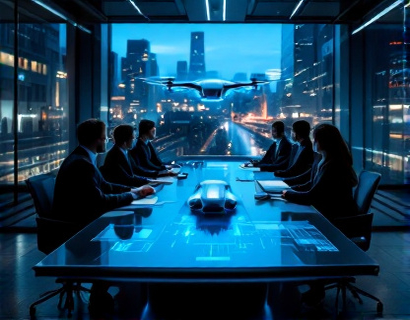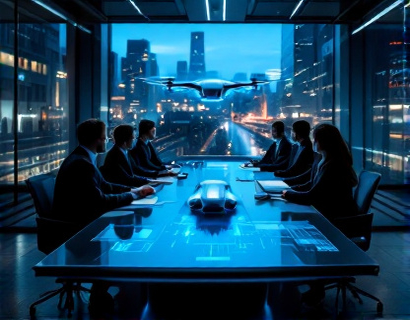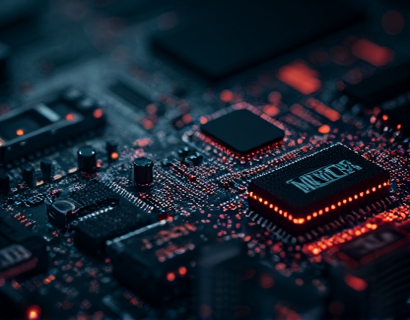AI-Powered Agent Revolutionizes Aeronautics: Enhancing Efficiency and Decision-Making for Industry Professionals
The aeronautics industry, a cornerstone of global transportation and commerce, is undergoing a transformative shift with the integration of artificial intelligence (AI) technologies. This revolution is not just about automating routine tasks but about fundamentally changing how professionals in the industry operate, make decisions, and drive innovation. An AI-powered agent, designed with the specific challenges of aeronautics in mind, is at the forefront of this change, offering unprecedented efficiency and insight.
The aeronautics sector, encompassing aviation, aerospace, and related services, is characterized by complex operations, stringent regulations, and a constant need for innovation. Traditionally, this industry has relied on human expertise and manual processes to manage its intricate systems. However, the volume of data, the speed at which decisions need to be made, and the complexity of operations have outgrown conventional methods. This is where AI-powered agents come into play, providing a robust solution to enhance operational efficiency and decision-making.
Streamlining Operations with AI
One of the primary benefits of integrating AI into aeronautics is the streamlining of operations. AI-powered agents can automate a wide range of tasks, from scheduling and maintenance to logistics and supply chain management. By automating these processes, airlines and aerospace companies can reduce manual errors, lower operational costs, and free up staff to focus on more strategic activities.
For instance, AI can optimize flight schedules by analyzing real-time data on weather conditions, air traffic, and aircraft performance. This ensures that flights are scheduled in a way that minimizes delays and maximizes efficiency. Similarly, AI can predict maintenance needs by monitoring the health of aircraft components, scheduling repairs before failures occur, and thus reducing downtime.
In ground operations, AI can manage the complex logistics of airport operations, from baggage handling to gate assignments. By analyzing patterns and predicting peak times, AI can allocate resources more effectively, reducing congestion and improving the overall passenger experience.
Enhancing Decision-Making with Data Insights
Decision-making in the aeronautics industry is critical and often based on vast amounts of data. AI-powered agents excel in processing and analyzing this data to provide actionable insights. These insights can range from predictive analytics to real-time monitoring, enabling professionals to make informed decisions quickly.
Predictive analytics, a key feature of AI, uses historical data to forecast future trends and outcomes. In aeronautics, this can mean predicting passenger demand, optimizing fuel consumption, and identifying potential safety issues before they become critical. For example, by analyzing flight data, AI can identify patterns that indicate a higher risk of mechanical failure, allowing for proactive maintenance.
Real-time monitoring is another powerful tool. AI can continuously monitor aircraft systems, air traffic, and other critical parameters, providing immediate alerts and recommendations. This is particularly valuable during flight operations, where timely decisions can prevent accidents and ensure safety.
Improving Safety and Compliance
Safety is paramount in the aeronautics industry, and AI plays a crucial role in enhancing safety measures and ensuring compliance with regulations. AI-powered agents can analyze vast datasets to identify potential safety risks and suggest preventive measures. This proactive approach helps in maintaining high safety standards and reducing the likelihood of incidents.
Compliance with regulatory requirements is another area where AI shines. The aeronautics industry is heavily regulated, and keeping up with changing rules and standards can be challenging. AI can monitor regulatory updates, assess their impact on operations, and ensure that all necessary compliance measures are in place. This not only saves time but also reduces the risk of penalties and reputational damage.
Driving Innovation and Competitive Advantage
The integration of AI in aeronautics is not just about improving existing processes; it is also about driving innovation. AI-powered agents can help companies develop new services and products, stay ahead of the competition, and adapt to changing market demands. For example, AI can assist in designing more efficient aircraft, optimizing routes for lower emissions, and developing advanced avionics systems.
Moreover, AI can facilitate collaboration and knowledge sharing among industry professionals. By providing a platform for data exchange and analysis, AI enables companies to learn from each other’s experiences and best practices. This collaborative approach fosters innovation and helps the industry as a whole advance.
Case Studies and Real-World Applications
Several aeronautics companies have already begun to leverage AI to transform their operations. For instance, a major airline implemented an AI system to optimize its flight scheduling and maintenance processes. The result was a significant reduction in operational costs and an improvement in on-time performance. Another aerospace manufacturer used AI to streamline its supply chain, reducing lead times and inventory costs.
A regional airport integrated an AI-powered traffic management system, which improved air traffic flow and reduced delays. Passengers reported a smoother travel experience, and the airport saw an increase in customer satisfaction scores. These examples demonstrate the tangible benefits of AI in the aeronautics industry.
Challenges and Considerations
While the benefits of AI in aeronautics are clear, there are also challenges and considerations that need to be addressed. One of the primary concerns is the integration of AI systems with existing infrastructure. This requires careful planning and coordination to ensure seamless operation and minimal disruption.
Data privacy and security are also critical issues. The aeronautics industry handles sensitive information, and ensuring the protection of this data is paramount. AI systems must be designed with robust security measures to prevent breaches and maintain trust.
Additionally, there is a need for skilled professionals who can develop, implement, and manage AI solutions. The industry must invest in training and upskilling its workforce to fully harness the potential of AI.
The Future of AI in Aeronautics
As AI technology continues to evolve, its role in the aeronautics industry is set to expand further. Future developments may include more advanced predictive models, enhanced autonomous systems, and deeper integration with other emerging technologies like the Internet of Things (IoT) and blockchain.
The potential for AI to revolutionize aeronautics is immense. By continuing to innovate and address the challenges, the industry can achieve new levels of efficiency, safety, and innovation. Professionals in aeronautics who embrace AI will be well-positioned to lead their organizations into a brighter, more sustainable future.










































